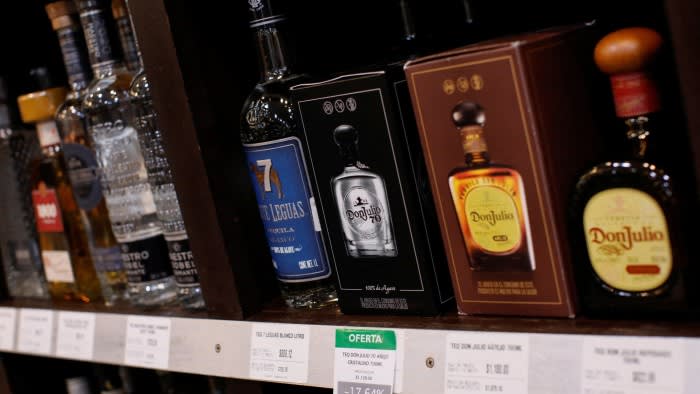Unlock the Editor’s Digest for free
Roula Khalaf, Editor of the FT, selects her favourite stories in this weekly newsletter.
The head of Diageo has warned that consumers are facing an “extraordinary environment”, as one of the world’s biggest drinks makers reported its first global drop in sales since 2020.
The company, which makes Smirnoff vodka, Casamigos tequila and Johnnie Walker whisky, expects the pressures on consumers to persist in the coming months, echoing a warning from fast-food chain McDonald’s on Monday.
“We are in a very extraordinary consumer environment,” said chief executive Debra Crew. “You do see persistent inflation that is really weighing on consumers and weighing on their wallets.”
The drinks industry was already facing a decline in demand from the peaks scaled during the pandemic, but Diageo’s grim outlook is likely to feed fears over the strains on consumers across major economies.
Shares in Diageo tumbled more than 9 per cent in early trading on Tuesday.
The concern from Diageo and McDonald’s comes as investors are paying close attention to signals that consumers are showing signs of flagging.
Simon Hales, analyst at Citi, said the outlook was “likely to prompt downgrades” for Diageo. “With near-term trading visibility still low we expect the stock to trade lower today,” he noted.
Diageo reported that sales in the 12 months to the end of June fell 1.4 per cent to $20.3bn, while the volume of drinks it sold during the period dropped 5 per cent as consumers cut back.
The “challenging consumer environment” would persist in the current financial year, which runs until June 2025, Diageo said.
The cautious outlook is set to deepen the challenges facing Crew.
In November, the company warned on profits, as sales in Latin America and the Caribbean plunged.
Since then several senior executives have stepped down, including chief financial officer Lavanya Chandrashekar, who will be replaced by Nik Jhangiani, CFO at Coca-Cola’s largest bottler Coca-Cola Europacific Partners, in September.
Diageo said it was now focused on restoring organic net sales growth to between 5 and 7 per cent, its medium-term forecast.
Analysts believe that the guidance is too ambitious, given the consumer environment and the cyclical nature of the spirits industry.
“It has become clear that spirits growth is volatile — sometimes it is far ahead of this range like the early years of the pandemic and sometimes well below like in recent years,” said Laurence Whyatt, analyst at Barclays. “Therefore such a narrow range appears naive at best and misleading at worst.”
Crew said the company expected to get back on track for its medium-term guidance one the consumer environment improved.
In North America, the company’s biggest market, spirits sales dropped 3 per cent on an organic basis, driven by a volume drop of 5 per cent as the US consumer showed increasing signs of strain. Tequila sales, which for the last few years have driven growth for the group, fell 5 per cent.
Declines were led by a 22 per cent drop in sales of Casamigos, which was co-founded by George Clooney. Sales of Don Julio, however, rose 12 per cent.
“While we see some pockets of down trading, we also see pockets of premiumisation,” Crew told reporters. Diageo’s strategy has long been based around premiumisation — the idea that people want to drink less, but more expensive products. In the cost of living crisis, this strategy is being tested.
In Latin America, where sales had plummeted in the first half after retailers bought more spirits inventory than they could sell on to inflation-hit consumers, net sales declined 15 per cent, led by a 30 per cent decline in Mexico, the group’s second-largest market, as consumers traded down to cheaper tequilas.
“We are not gaining share in that market, and we are looking at how we deploy that portfolio in Mexico so that we can get back into shared growth,” Crew said.


